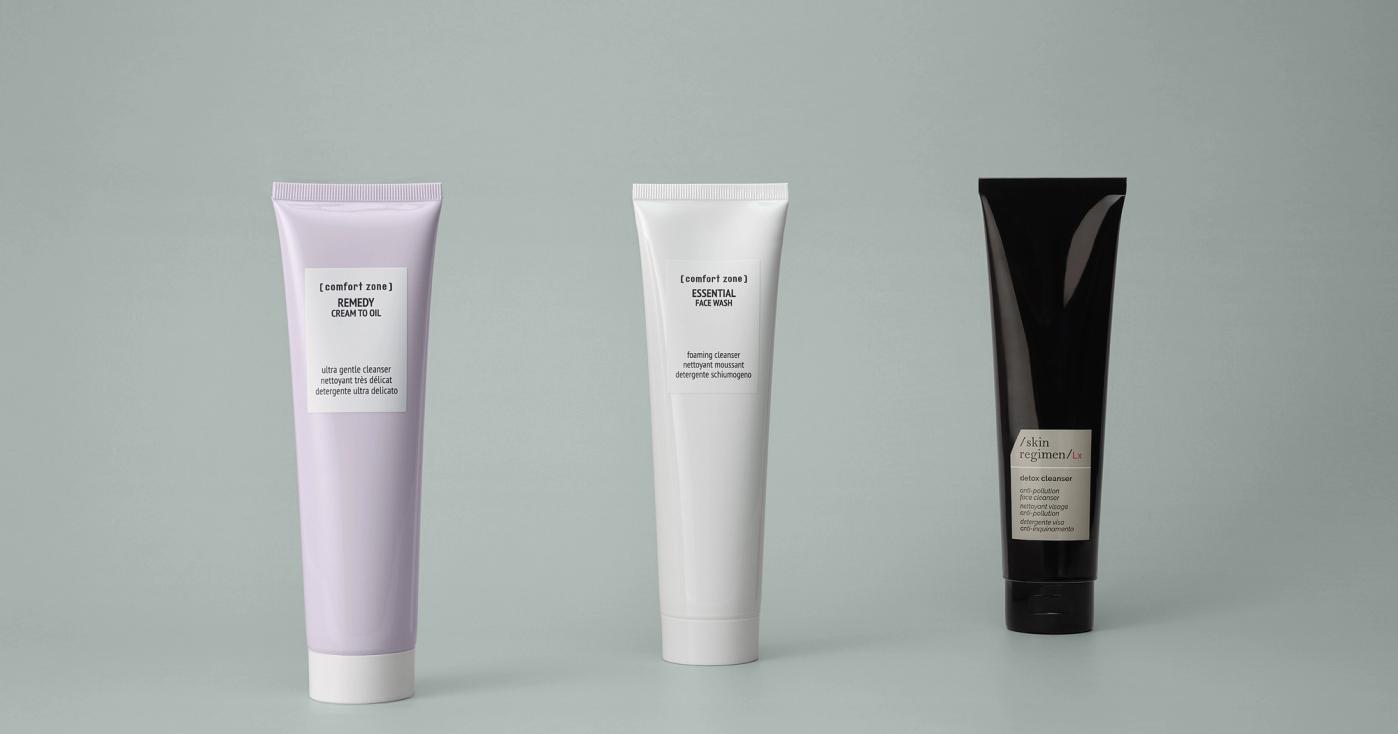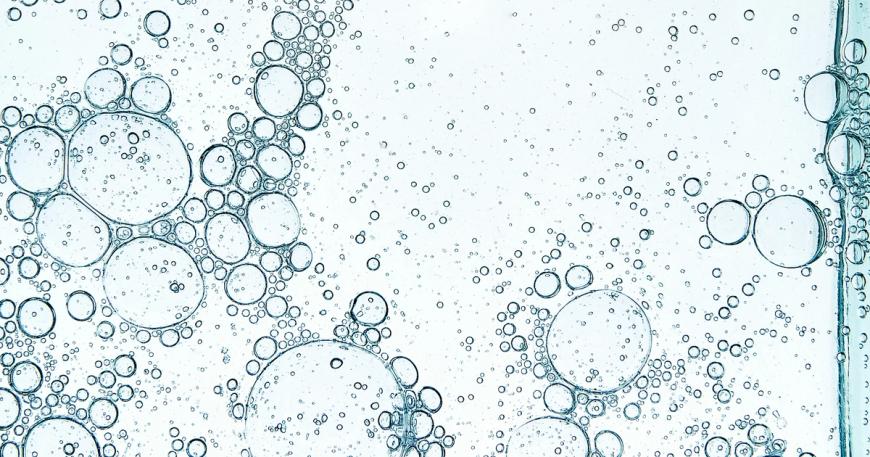Essential Face Wash
Gentle foaming cleanser
skin care
Maria Giulia Simonazzi | International Training Manager
10 min read

Skincare is fundamental for achieving and maintaining healthy skin. The canvas upon which all other products operate is determined by one foundational step: cleansing. Cleansing doesn’t just remove impurities; it preps the skin, setting the stage for subsequent products to perform at their peak. From sunscreens to anti-aging serums, their effectiveness hinges upon this initial, crucial step. Cleaners are the first line of defense in a proper skincare routine, ensuring skin remains balanced and prepared for the day.
This skincare guide intends to shed light on the multifaceted world of cleansers. While they might seem straightforward, the nuances between different types of cleansers and their close relatives—face washes—play a pivotal role in determining skin health.
We aim to provide a thorough understanding of the diverse types of cleansers available on the market, and how to match them to specific skin types and concerns—all while being anchored in the Comfort Zone philosophy of conscious skin science. This way, we will ensure you have a skincare approach that’s rooted in rigorous research and a deep understanding of what your skin needs.
At the forefront of any comprehensive skincare regimen is a skin cleanser, but what is a cleanser, really? It’s a product that’s specifically formulated to purify the skin from a day's (or night's) accumulation of dirt, sweat, excess oils, and other environmental impurities. It acts as a reset button, allowing the skin to breathe, regenerate, and absorb other skincare products more effectively.
Diving deeper into the mechanics, cleansers work on a microscopic level, affecting the skin’s natural oils. Through the use of surfactants, compounds that bridge the gap between water and oil, cleansers emulsify and lift away impurities.
Essential to note, however, is that not all oils are removed. A well-formulated cleanser maintains the skin’s barrier by retaining the necessary lipids that keep the skin nourished and moisturized. Key ingredients found in cleansers, such as glycerin and ceramides, play a vital role in ensuring that the skin remains hydrated, preventing that all-too-familiar feeling of tightness after washing with lukewarm water.
When selecting a facial cleanser to add to your own routine, remember that it isn’t merely about cleaning the skin. It’s an informed choice that considers the product’s ability to cleanse while respecting and preserving the skin’s natural barrier. Therefore, it’s vital to understand your skin’s unique needs and to choose a cleanser that aligns with those needs, ensuring optimal skin health and the effectiveness of your overall regimen.
Though often used interchangeably, cleansers and face washes each serve unique roles. Face cleansers are typically formulated to be gentler and suitable for a variety of skin types. Their texture can range from creamy to gel-like, and they primarily focus on removing surface impurities, including makeup. This dual-purpose approach—serving as both a makeup remover and a purifier—sets cleansers apart.
Conversely, face washes lean toward a slightly more aggressive cleaning strategy. They’re generally designed to delve deeper into the pores, ensuring a rigorous cleanse. Their texture is often foamy or soapy, and they’re more akin to soaps or scrubs in their application, though not as abrasive. While exfoliating scrubs physically remove dead skin cells, and soaps can sometimes strip the skin of its natural oils, face cleansers maintain a balance. They’re able to clean without causing harm, making them apt for daily use.
Moving onto an advanced skincare strategy: the double cleanse. This method involves first using a cleanser, particularly an oil-based one, to break down makeup, SPF, and pollutants. This is then followed by a face wash that targets the pores, ensuring a deeper cleanse. This technique amplifies the benefits of each product, resulting in a skin-cleansing routine that is both comprehensive and considerate of varying skin needs.

Every day, our skin faces an onslaught of impurities. Dirt, grime, pollutants, excess oil, and makeup assail the skin’s surface. This isn’t just about aesthetics; the buildup of these elements can have detrimental consequences for our skin’s health. Dead skin cells, for instance, accumulate and form a barrier, preventing the skin from effectively absorbing hydration and essential nutrients. This results in common skin concerns such as breakouts, pimples, and a generally lackluster complexion. Therefore, a good cleanser is more than just a step in skincare—it’s a frontline defense.
The benefits of consistent cleansing extend beyond just immediate cleanliness. For those constantly battling skin concerns like acne, the root cause often lies in excess oil production and clogged pores, which provide a breeding ground for bacteria. Similarly, for individuals with dry skin, failing to cleanse means layers of dead cells remain, causing the skin to appear even more parched and flaky. The right cleanser, chosen for specific skin types, not only tackles these concerns head-on but also provides proactive care.
Skincare isn’t just about looking good. It’s a holistic process that encompasses well-being, knowledge, and ethical choices. Enter Comfort Zone, a brand that embodies conscious skin science in its truest sense.What does that mean, exactly? At its core, conscious skin science marries an unerring commitment to sustainability with deep-seated scientific knowledge and understanding of skin health. When you choose Comfort Zone, you’re opting for a brand that is as kind to the environment as it is effective for your skin.
Dive into our range of cleansers, and you’ll see what we mean.. Each cleanser is carefully formulated with powerhouse ingredients like salicylic acid, vitamin C, and hyaluronic acid—all renowned for their skin-enhancing properties.But it’s not just about what’s in the bottle; it’s also about the bottle itself. We here at Comfort Zone are unwavering in our commitment to sustainability, adopting eco-friendly packaging, responsibly sourcing ingredients, and adopting green production processes. Our dermatologist-approved formulations strike the perfect balance between nature, science, and skin health.
Cleansers are foundational, acting as the bedrock upon which any effective skincare routine rests. Choosing the right cleanser for your skin type not only ensures optimal skin health but also maximizes the benefits of subsequent skincare products.
Featuring a diligent blend of scientific knowledge and sustainability, Comfort Zone offers a range of cleansers that stand testament to this principle. As you invest time and thought into your skincare regimen, remember that a good cleanser is more than a mere product—it’s a pledge to nurture, respect, and honor the skin you’re in.

Gentle foaming cleanser
Ultra gentle cleanser
Anti-pollution face cleanser
Gentle cleansing balm
Face eye lip make-up remover